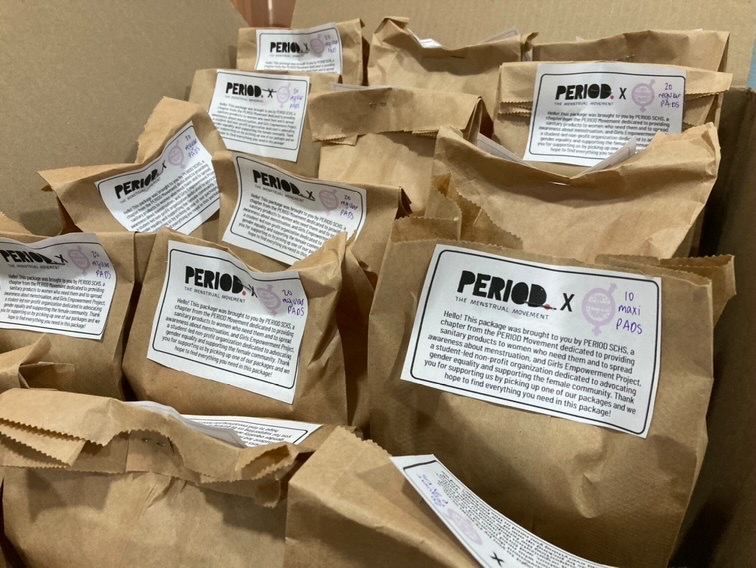Girls Empowerment Project and PERIOD Club host menstrual product drive to combat period poverty
One organization the donations were distributed to was the South Valley FISH Food Pantry.
After two weeks of publicizing and accepting donations, SCHS’s Girls Empowerment Project and PERIOD clubs collected a total of over 3,000 menstrual products. Period Drive, the school-wide community service event, ran from March 3 to March 17, and the menstrual products collected will be distributed to homeless shelters, food banks and nonprofits in order to reach those who do not have access to such items.
GEP and PERIOD officers created the drive in order to collect unopened sanitary products, such as pads, tampons and menstrual cups, from members of the SCHS community. They will then package and donate the products to various organizations, and those who donated had the opportunity to earn up to two community service hours. According to GEP vice president, senior Vivian Tran, aside from helping those in need, the product drive was planned with intentions to destigmatize menstruation.
“Part of it (the drive) was wanting to emphasize the message that periods shouldn’t be so taboo, and that not talking about it or holding certain stereotypes about it can be mentally and physically harmful,” Tran said. “Most importantly though, we wanted to give back to our community during a time of stress and uncertainty, in a way that people don’t usually consider.”
According to actionaid.org.uk, period poverty is “a global issue affecting women and girls who don’t have access to safe, hygienic sanitary products, and/or who are unable to manage their periods with dignity, sometimes due to community stigma and sanction.”
PERIOD advocacy coordinator, sophomore Kaitlyn Nguyen, helped plan the event with hopes of providing disadvantaged with menstrual products, especially amidst the COVID-19 pandemic.
“These products are necessary to those who menstruate, but they are not covered by welfare programs or SNAP (Supplement Nutrition Assistance Program). During these unprecedented and difficult times, it’s even harder for those to have easy access to these necessities,” Nguyen said. “We can make it easier by providing these care packages with menstrual products and donating them to places that can safely and easily pass them out to those in need.”
Tran said the idea to host a menstrual product drive was initiated during a discussion at a GEP meeting about period poverty and the stigma around periods. The two clubs decided to work together in order to incorporate PERIOD into GEP’s annual care package event.
“With PERIOD Club coming to SCHS, we thought it would be a good idea to collaborate with them and combine our usual care package event with their club goal of fighting to end period poverty,” Tran said.
According to Nguyen, the planning process began in January and consisted of a collaborative meeting to agree upon a timeline. The clubs then created a promotional video to help publicize the event through social media, and reached out to homeless shelters and food banks to distribute the products to.
For PERIOD club president, sophomore Kavi Rajesh, the virtual planning process and inconveniences relating to COVID-19 created barriers while making the event happen.
“COVID was probably our biggest barrier. We were waiting for a while for COVID cases to drop and until SC (Santa Clara) County was in a safer zone to host the product drive,” Rajesh said. “We would have also had a more streamlined process without trying to plan everything out virtually.”
Moving forward, Rajesh plans on finishing the menstrual drive safely and carefully.
“We will be counting products from SCHS soon and organizing them into paper bags for the product drop off,” Rajesh said. “We pack all the products individually into paper bags for each menstruator that we donate to while wearing gloves and a mask, especially to take precautions during COVID.”
One donor, sophomore Aminah Hedges, found out about the drive through Instagram flyers and donated a total of 120 pads. She was grateful for the convenient opportunity to help combat period poverty and the pink tax.
“I donated four packs of pads, around 120. I’m glad both clubs made it easy to help an important cause,” Hedges said. “Not only does it directly help people affected by period poverty but also draws attention to the issue and periods in general,” she said. “I didn’t quite realize how much pads and tampons actually cost. It’s ridiculous how expensive they are, especially because they’re necessary and pretty cheap to make.”
Senior Rayana Ysabella Palacios agreed.
“I donated because ever since I experienced my first period, I wondered how homeless or needy women could get these products. Period products are extremely overpriced on their own, and I knew they’d have other things to worry about besides their monthly cycles they can’t alter,” she said.
As a senior, Tran hopes the menstrual drive was the start of a tradition that continues after her graduation. For the time being, she said she plans on working with her fellow officers to keep helping her community and making a difference.
“I really hope that after the other seniors and I have graduated, the tradition of doing care packages will continue in GEP, and that menstrual products aren’t ignored when thinking of potential things to donate,” Tran said.
Rajesh agrees and aspires for the menstrual drive to be the beginning of a legacy that provides those who are struggling with proper menstrual products and combats the taboo around menstruation.
“The period drive helped raise so much awareness on period poverty around our area, which was one of our main goals in planning the drive. All the products go to homeless and financially struggling women, and it’s amazing to help people in need, especially during the COVID pandemic and crisis,” Rajesh said. “We hope that our period drive is a catalyst to more drives in the future and highlights the serious issue of period poverty.”


